Welcome back,
In today’s mobile home investing Q&A video series I am sincerely honored to be talking with active mobile home investor, Chuck. Chuck has been investing in traditional real estate for many years prior to getting started with mobile homes. Over the past few months investing in mobile homes Chuck has already invested in mobile homes inside pre-existing parks, attached to private land, and now moving newer mobile homes to private land in order to sell the homes and rent the land. Chuck is an absolute go-getter and the real-deal!
Even though Chuck is extremely busy with a number of deals going at any one particular time he is super approachable, down to earth, and willing to help others. Chuck was candid and kind enough to record a 39-minute video discussing some of the do’s and don’ts he’s learned investing in mobile homes.

Steps needed when moving mobile homes to private land or a pre-existing mobile home park.
In today’s video we talk about Chuck moving a new mobile home to a piece of private land that he also owns. Before transporting any manufactured home or mobile home please see some of the advice below.
1. Moving to a pre-existing mobile home community: The mobile home community manager will typically have requirements and criteria any new/used mobile home may need to meet before being verbally-approved to move into the park. With that said some park owners/managers have little/no criteria as they simply want the park filled with more homes/people to produce more revenue.
✔ What the park manager will help you with? The park manager will show you any available mobile home pads where you may move your home to. The park manager may also likely direct you where to file and apply for permits in order to move and set up your mobile home within the community. The park manager may also be able to tell you what the local municipality’s criteria are when you physically move-in a used mobile home; this includes, age limit, size limit, permits, decks, steps, ACs, weird laws, etc. Ask the manager for any mobile home transportation company references or referrals.
✔ Who you will need to call and see next? Do not simply trust the community manager. Make sure to call the local county and city municipality’s zoning department, code department, and permit office. (This may be overkill however it is better to have complete clarity as some of these department’s overlap in some locations.) Let the clerk over the phone know your intention of moving in a used mobile home to the desired location and asked them for requirements needed from you now and moving forward. Understand the steps needed to file for permits, move the mobile home, and have it set up and installed at the desired location. Pro Tip: When talking with the clerks in the local government offices aim to get an understanding if they are happy with you adding more mobile homes, or if they have any resentment or negative-ness towards adding more mobile homes to their city in general. This attitude is not necessarily a deal-breaker however simply good to know. Some cities make it very easy for you to move in a mobile home, while a minority of cities make the inspection process a nightmare of endless hurdles.
2. Moving to a parcel of private land you own or control (zoned for mobile homes): Great job owning/controlling a small parcel of land to place this mobile home. Ideally there is already adequate electric, water, and wastewater infrastructures in place. Perhaps there was once a mobile home in this location but has since been removed or you are having it removed.
✔ Confirm the current incoming water source (well, city water, other) is functioning properly.
✔ Confirm the sewer waste pipes, septic system, septic tank, leach field, etc. is in proper working order. An experienced plumber can greatly help in giving you an understanding of the lifespan and health of your current system.
✔ Confirm electric going to power pole (and then to the home) is working and sufficient for the new mobile home. An experienced electrician can greatly help in giving you advice for understanding your particular situation and mobile home.
✔ Confirm with the local code department the set-backs for the property. This is the distance of land on each side of the mobile home is needed. Example: 10-foot-setbacks means that your mobile home must be at least 10 feet minimum from the edges of your property line. Aim to ask this clerk if any surveys, blueprints, or architectural maps will need to be created. Find out if this office has a record of where the current water pipes, foundations, sheds, septic tanks, and/or easements are on your property… The reason you are asking these last questions is to determine if you will be required to verify where these items are on your property if the city has no previous survey.
✔ Which permits are required and when they are required? Permits will very likely need to be applied for during multiple stages of the move, set up, and installation. Do this: While talking with the local permit office clerk over the phone aim to ask about all the permits (moving, set-up, HVAC, electric, water, gas, etc) needed moving forward, the costs, and what to do after these permits are applied for. Go to the local permit office in person if you feel more comfortable asking these questions face-to-face. Pro Tip: If you’ve never moved a mobile home then the task may seem monstrous. In reality once you have moved a handful of mobile homes the process is fairly straightforward. However it is critically important to know the local rules and what the local inspectors are going to want to see depending on this specific municipality.
✔ Confirm the existing foundation is adequate for your specific mobile home, and with the local municipality. This can be found out by talking to your local code department as well. You may also want to speak to a local experienced mobile home dealer in the area that sells other new and used mobile homes. These local dealers will likely have a good bit of experience with regards to the local ground/soil conditions and which foundation types are suggested or required in the area.
✔ Anything else required in your area that we’re missing? Please comment below.
Pro Tip: Aim to get references for quality mobile home transportation companies from every community manager you speak to. A mobile home mover that has experience, comes recommended, is proactive, and knows what they are doing can make your mobile home move and set-up very easy for you. Aim to get price/time quotes from at least three mobile home transportation companies before you need them.
Related article: Mobile home investing Q&A #10-full-time MH investing, Mobiles with land, misjudgments and more
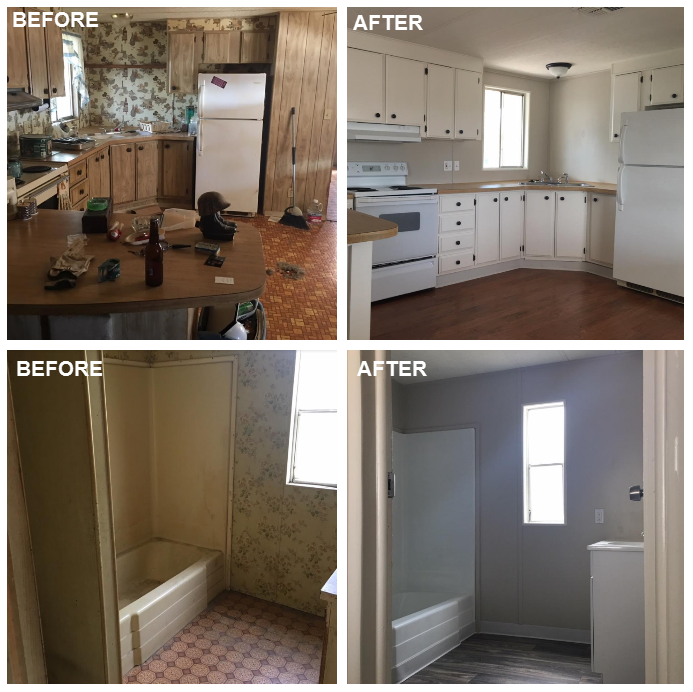
The video below is just over 39-minutes in length. We discuss a number of topics plus Chuck really opens up about some personal experiences and misjudgments he has experienced along his continued journey. Set aside some time to listen to the actionable suggestions and tips in the full video below. A special Thank You to Chuck for opening up his heart and business to help other investors he’ll likely never meet.
In this mobile home show we cover: (Times are provided to fast-forward video if needed.)
[bullet_block style=”size-16″ small_icon=”17.png” width=”” alignment=”center”]
- 0:54 How did you get started in real estate?
- 2:51 You gave away your first mobile home for free?
- 4:23 Thoughts driving through your first few mobile home communities?
- 4:46 1st real mobile home deal inside a park.
- 5:03 First mobile home investment for cash-flow?
- 6:22 Deal #2
- 7:30 Deal #3
- 8:22 Fixing mobile homes nicely and selling for cash.
- 9:04 Building a local reputation.
- 10:01 Starting a major rehab?
- 10:50 The dumbest mobile home investing thing Chuck ever did (to date).
- 11:20 Handyman horror story.
- 12:32 What repairs do you commonly make on mobile homes?
- 15:08 Do you invest in mobile homes with private land attached?
- 15:38 How do you find some of your mobile homes attached to private land?
- 17:04 Buying land to rent to mobile homes for cash-flow.
- 17:55 You are buying 2 mobile homes on private land?
- 18:43 Are you selling any mobile home/land packages for cash?
- 19:20 Dealing with Realtors when buying mobile homes with land.
- 24:02 Lessons learned investing in mobile homes with private land.
- 24:30 Dealing with your money partners.
- 26:57 Could this have been avoided by asking the right questions?
- 30:35 Being a licensed Realtor and dealing with mobile home sellers.
- 32:12 What are your mobile home goals moving forward?
- 34:17 Why are sellers selling to you instead of selling themselves?
[/bullet_block]
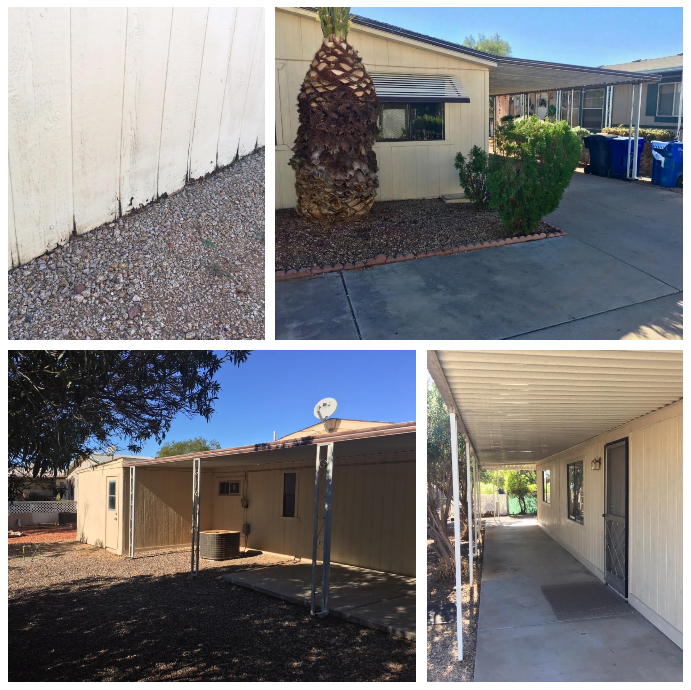
Different types of common mobile home financing?
Some mobile homes are absolutely bank-financeable as long as the buyer is approved with enough money down. Other mobile homes are virtually impossible to obtain a traditional bank or conventional loan for due to their age, condition, foundation, # of times the home has been moved, and more. Please see the list below of few different types of common mobile home financing.
1. Borrowing money from friends/family: Whether you are buying a mobile home or selling a mobile home you may come across people that have or will borrow money from their friends and family in order to purchase a primary residence mobile home. As an end-user-buyer, seller, or investor there is usually nothing wrong with this.
Pro Tip: As an investor we want to be aware of any sellers that owe money on their unwanted mobile homes to a family member or friends. The reason for this is because a family member or friend will often times be more forgiving than a bank will if the seller is unable to get a high enough sales price to pay off the family member’s or friend’s private loan. This means you may be able to purchase the home for less money than the seller owes on the home. This low purchase price may be due to repairs needed or many other factors.
2. Local bank financing: Local banks and local credit unions may be a very good source for financing local mobile homes to end-users that will be living inside the mobile homes and raising their families. Remember that Conventional loans, FHA loans, and VA loans are similar in that they are all issued by banks and other approved lenders, but there are some major differences between these types of loans.
✔ FHA financing: FHA loans are loans insured by the Federal Housing Administration (FHA). If the borrower defaults on the loan and the mobile home isn’t worth enough to fully repay the debt through a foreclosure sale, the FHA will compensate the lender for the loss. This makes the lender more likely to lend, and typically for a lower interest rate and down payment than conventional financing as there is less risk to the lender. Learn more about mobile home FHA financing by clicking here.
✔ VA financing: VA loans are loans insured by the Veterans Administration (VA). If the borrower defaults on the loan and the mobile home isn’t worth enough to fully repay the debt through a foreclosure sale, the VA will compensate the lender for the loss. This makes the lender more likely to lend, and typically for a lower interest rate and down payment than conventional financing as there is less risk to the lender. VA loans are for members of the armed forces, reservist, the national guard, and veterans.
✔ Conventional financing: A conventional loan is not insured or guaranteed by the federal government. This means that, unlike federally insured loans (VA & FHA), conventional loans carry no guarantees for the lender if the borrower fails to repay the loan. Due to the fact there is no government insurance, conventional loans pose a higher risk for lenders so credit and income requirements from the borrower are typically stricter and more expensive than for FHA and VA loans.
3. Nationwide lender financing: There are a variety of companies that specialize in financing mobile homes inside pre-existing parks and on private land. These nationwide lenders have various requirements and typically lend their own internal monies. This means that many of these lenders control their own underwriting requirements, and may differ greatly from local banks. When dealing with companies like this you will need to call each one to understand their lending requirements and if your specific situation fits their lending criteria. Some of these companies include 21stmortgage.com, Vanderbilt mortgage, and Triad financial services. Any other good lenders we are forgetting?… Please comment them below.
4. Local loan agencies or Private money mortgage companies: There may be local companies that specialize in lending other-people’s private money for local real estate deals that make good financial sense. Pro Tip: Ask the organizers and/or presidents of your local real estate investor clubs if they know any small loan agencies or private money brokers nearby that specialize in lending smaller amounts of private money on 15+ year notes to end-buyers.
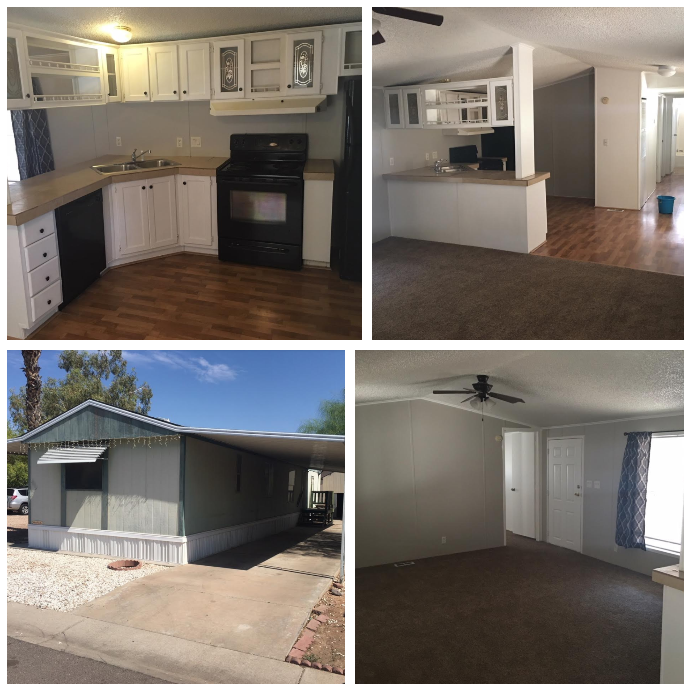
How to help stop handyman theft? Mini-lesson for newer MH investors
The best way to avoid a deadbeat handyman is to never get involved with one in the first place. Deadbeats, con-artists, excuse-makers, jerks and shady handymen all make themselves know sooner or later. Much like any relationship, there are specific and general things (attitudes, words, and traits) to look for.
Disclaimer: This mini-lesson concerning mobile home handymen will be greatly more effective and memorable if you feel a certain way… angry (in a constructive way). Angry at your ex-handyman, however mainly angry at yourself for allowing this to happen and not following the advice below. Do this: Place yourself in the shoes of Chuck in the video above. You were happy about getting more mobile home deals lined-up through a local park you like. All your hard work is paying off. Now you need to prove yourself to this park manager by repairing these homes quickly to then resell. You quickly hire a new handyman because you need help fast to fix all these mobile homes. The handyman looks you in the eyes and lies, lies, lies. This handy-person then takes your money, and without fixing anything laughs all the way home. You lose $7,000+.
If you read the paragraph above than hopefully this is the maddest and angriest you’ll ever get with a handy man stealing from you. Learn from our mistakes. It is highly encouraged to follow the advice below.
[bullet_block style=”size-16″ small_icon=”41.png” width=”” alignment=”center”]
- Ask for past referrals and check references.
- Make sure your handymen and contractors have at least 3 years of mobile home rehab experience. Don’t listen to a contractor or handyman that tells you mobile homes and single-family homes are basically the same construction.
- Talk is cheap. Action speaks so much louder than words.
- It is not your job to train your handyman or contractor.
- Always have a written Contract with your handymen including penalties for delays.
- Do not pay a contractor or handyman upfront. Period.
- Remember you’re the boss!
[/bullet_block]
Related article: 50 tips while working with mobile home handymen and contractors
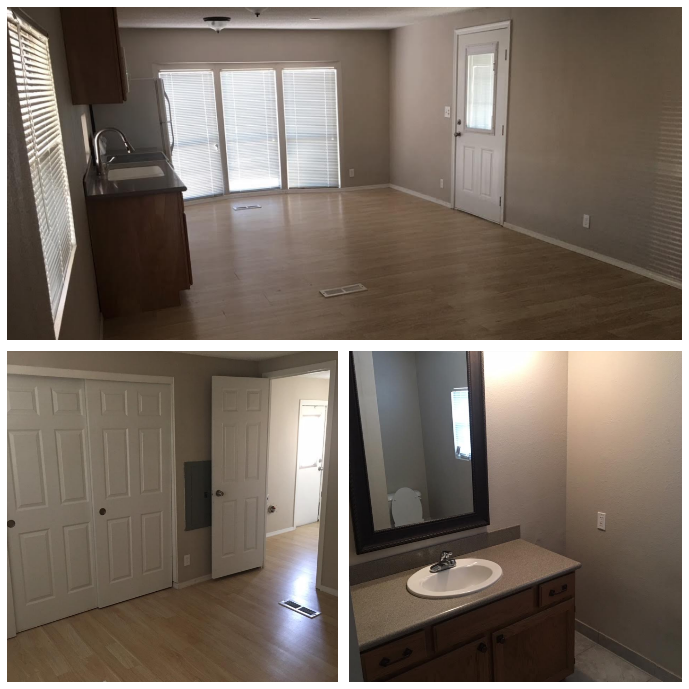
In conclusion, mobile home investing takes hard work and typically daily effort to make a consistent name for yourself and help multiple buyers and sellers monthly. You will never learn everything you need to know about real estate investing from reading books or watching videos. While there are many ways to make money in real estate, there are countless ways to lose profits as well. Have fun and take daily action to reach your financial goals sooner rather than later. If you have questions please ask them. There are plenty of active investors around to give you help and guidance if you simply ask for it.
Have comments or mobile home questions? We’d love to hear them below?
Love what you do daily,
John Fedro
support@mobilehomeinvesting.net

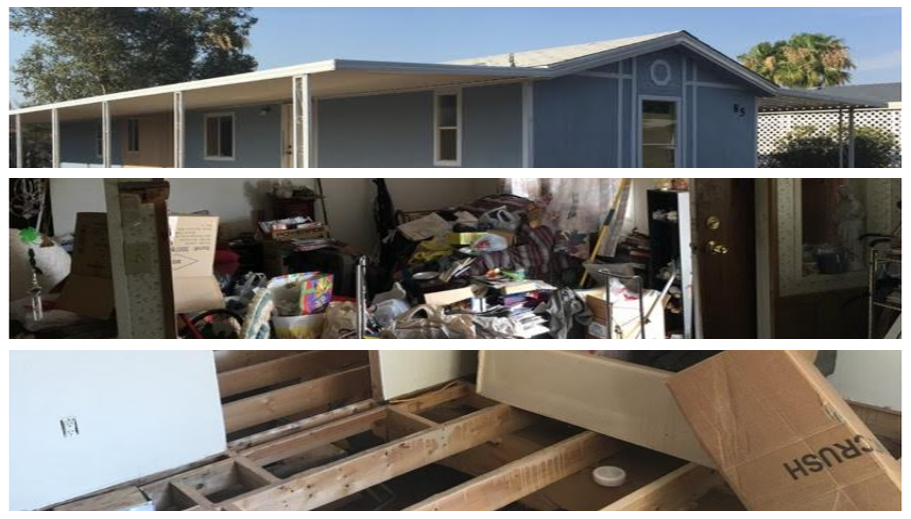

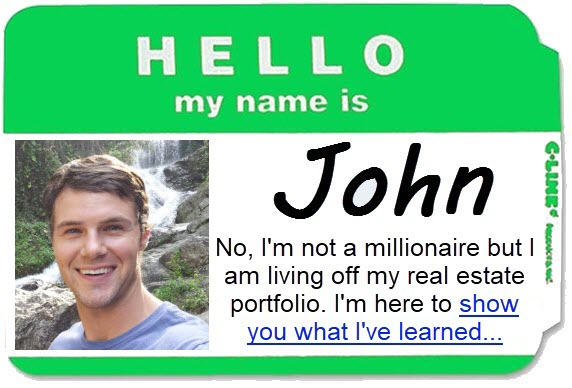





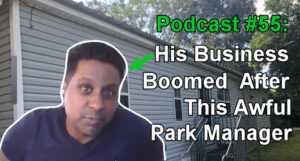


10 Responses
Congratulations you both! I really need to hear this handy man advice cause Im dealing with my handymen keeps giving me excuses without any work being done. We have a verbal agreement only. I need to get a new handyman fast. Thank you both again.
Craig Roy
Hi Craig,
Thank you for reaching out and connecting. Additionally, thank you for your kind words. I’m super proud of everything that Chuck is achieved in a relatively short period of time. It sounds as if you are already active investing in local mobile home properties. Congratulations for any and all people that you’ve helped and will help moving forward! Keep up the great work. With regards to the handyman I would absolutely encourage you to be slow to hire and very quick to fire. We are looking to build a relationship with the handyman the same way we are looking to build a relationship with our tenant-buyers. We wouldn’t take any disrespect or excuses from our tenant buyers, and nor should we take it from our handy folks either. Also check out the previous lesson with regards to turning some of your tenant buyers into low-risk handyman and handywomen. There is definitely a lot to learn and start to implement in your business. Including always having a written contract between you and any and all handy people/contractors. If everybody does what they say they are going to do than perfect, however when things go wrong a written contract is very helpful. Additionally, rarely paying handyman before they get started on work can also eliminate a lot of the theft and excuses you may hear. The reason for this is that once the handyman gets paid they lose their incentive to work hard or be as nice. With that said these are typically not the handy people we are looking for, we are looking for self-starters and driven handymen that want to further our relationship with an investor for more and more work down the road. I hope this helps and make sense. I definitely went on a bit longer than expected however if you have any follow-up questions or concerns please never hesitate to reach out again or email me directly. All the best. Keep in touch.
Talk soon,
John
Hello John. Seriously thank you for this posting and interview. I really like this concept of investing. I think my thinking is like Chucks too. I want to make money any way I can with real estate. Its almost like there are too many things and not enough thime. Any advice on where to start looking? Iwill be looking at your website and will be in touch. Thank you again. Cheers! JG
Hi Javier,
Thank you for reaching out and connecting. Sounds like you are relatively early in your real estate career. In my opinion investors can way so much time, energy, and money by pursuing real estate avenues they were never really ideal for or understood in the first place. For this reason I think it is so important to take a few weeks or months to really figure out what type of investing you want to focus on and your plan of attack. This will obviously take a good bit of research on your part and asking question after question after question. Only with more and more clarity will you be able to really understand which real estate niche you want to pursue. Assuming that you do want to pursue a specific niche, mobile home investing let’s say. The next piece of advice for you is to head through this website and gather all the questions that you have. Feel free to asked them to me or to another local mobile home investor that may be able to help provide you with the answers to your questions. In short, you should know the steps that you need to take not just in order to purchase a deal, but also every other step along the way in order to finally selling or filling the mobile home. You should know all the steps needed, and not just how to get started. The reason I mention this is because in your email you ask about how to get started, and while that is important it is equally important to know what to do most other steps along the way after you get started. It’s good to see your goal in sight even at the beginning. I hope this helps and makes of it a sense. All the best. Keep in touch.
Talk soon,
John
Hi John,
I apologize for being off topic but I couldn’t find a related topic to my question. I’m in California, I’m about to pay off my mobile home, the loan is under an ex-friend and me as co-signer (I don’t know where he is). All the payments are under my name, i have them all. I called the mortgage company to ask if this person can be removed from the loan and they said the only way is to re-finance just under my name or just to pay it off and ask for the titile to come out just under my name. Is that true? I don’t want to pay it off to later find out that his name has to be on it, I know the process to remove a person from a title is a hassle. Thank you!
Hi Paola,
Thank you for reaching out and connecting. Additionally, thank you for the detailed message is the certainly does help me answer your question a bit better. I regret to hear about your ex friend bailing and leaving you to pay the entire loan. These two options do sound correct however I share your suspicion in wondering if the person over the phone was just telling you what you wanted to hear. I would encourage you to call back a few times and aim to speak with the manager or somebody in charge to make sure that the title can 100% come to you and only in your name. The title may be able to be printed with the word “and/or” or “or” in between your names. This way only one of you needs to sign to transfer title into someone else’s name. You could also forge the name however this is not recommended. I only mention this because this is an option however again not recommended or advised. I hope this all helps and make sense. If I missed something or if you have any follow-up questions or concerns never hesitate to reach out any time. Additionally, if you find out an easier solution or anything else interesting feel free to comment back and let us know. Keep in touch. All the best.
Talk soon,
John
Thank you for the interesting article.
Thanks for commenting and following along. Moving forward if you have any handyman perspective or advice please never hesitate to reach back out any time. Keep in touch. All the best.